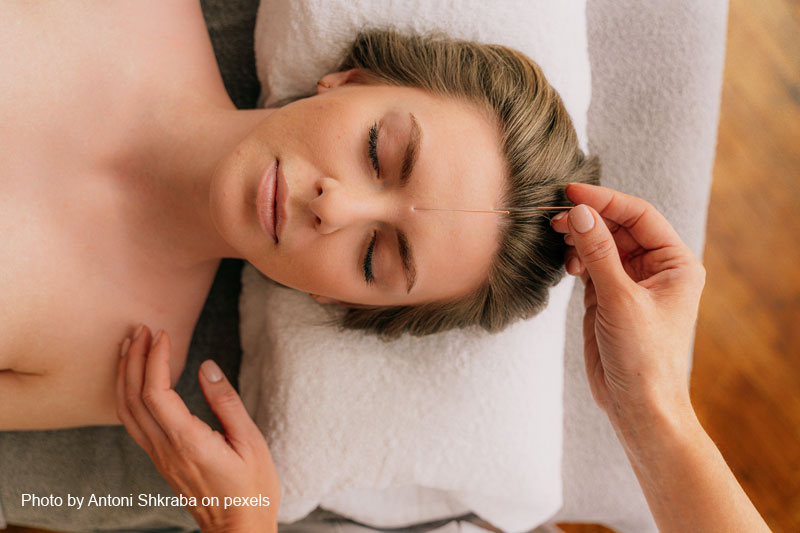
Acupuncture has been a core element in traditional Chinese medicine for thousands of years. It is a technique used to balance the flow of energy or life force, also known as Chi or Qi, that flows through pathways in the body. And while acupuncture can benefit one’s health in many ways, it can also improve fertility. How does it benefit those looking to address their fertility?
What is acupuncture?
Acupuncture involves inserting hair-thin needles through the skin at various points in the body. By inserting these needles along pathways in the body, also known as meridians, the balance in one’s Qi is restored, which promotes overall wellness.
While it is unknown exactly why acupuncture works, there are several theories, which include:
- It may stimulate the release of endorphins, which are natural pain-relieving chemicals in the body.
- It may influence the automatic nervous system. Needle placement can impact breathing, blood pressure, and heart rate.
- Increased blood flow to specific areas can improve healing times and reduce inflammation.
Acupuncture is done to address a variety of conditions, including:
- Chemotherapy side effects, including nausea and vomiting
- Dental pain
- Fibromyalgia
- Headaches, including tension headaches and migraines
- Lower back pain
- Neck pain
- Osteoarthritis
- Menstrual cramps
- Respiratory disorders
- Tennis elbow and Golfer’s elbow
- Anxiety
- Chronic pain
- Insomnia
- Depression
- Stress
- Skin appearance
- Addiction
Acupuncture is a useful tool for addressing multiple conditions, thus helping the body deal with pain or other symptoms naturally.
How can acupuncture benefit fertility?
While acupuncture is used to address a variety of health conditions, one area where it has shown great promise is fertility. Infertility is defined as being unable to conceive after one year of actively trying to conceive. Unfortunately, infertility affects about 12% of women between the ages of 15 and 44. But in more than one-third of couples facing infertility, both a male and female factor plays a role.
There is no conclusive evidence that acupuncture alone will cure infertility. However, much research supports that acupuncture can improve a couple’s chances of conceiving. For instance, one study showed that acupuncture performed directly before and after in-vitro fertilization (IVF) aided embryo transfers more than in women who only made lifestyle changes. Additional studies have also found that acupuncture can improve sperm and ovarian function, which may also increase the chances of conceiving.
Despite the fact that there is no conclusive evidence that fertility is increased with acupuncture, it can work for many couples, even if there is no direct impact on the function of the reproductive organs. This benefit is thought to come from multiple mechanisms of action, including:
- Acupuncture can boost blood flow to the reproductive organs.
- It can balance hormones in the body to achieve optimal conditions for conception.
- Acupuncture relieves stress, which can be a huge barrier for couples struggling to conceive.
In addition to these benefits, acupuncture is safe for couples trying to conceive, providing trained and certified practitioners administer it in a clinical setting. Acupuncture also has very few side effects or risks. Among the common risks are:
- The risk of the acupuncturist pushing a needle in too far, resulting in an injury.
- A risk of infection if the practitioner uses unsterilized needles.
- Excessive bleeding if the patient has a blood clotting disorder or takes blood thinners.
- Pain and bleeding from the needle insertion.
- Risk of a skin rash or allergic reaction.
- Bruising around the area where needles were placed.
In rare instances, acupuncture could result in blood vessel and nerve injuries, organ injuries, and brain or spinal cord injuries. Therefore, it’s always a good idea to consider speaking with your OB/GYN about pursuing acupuncture before making an appointment.
What can I expect at an acupuncture appointment for fertility?
Before starting an acupuncture session, the practitioner will usually engage in an in-depth consultation to help them select the ideal therapy for you. To improve fertility, acupuncturists may focus on acupuncture points in the ear or head to promote relaxation and points in the abdomen, legs, and feet to improve blood flow to the reproductive organs.
Once the needles are in place, they are typically left in for between 15 and 30 minutes while you relax in a room. Any subsequent sessions will be shorter since they will not include a long consultation. The practitioner may also recommend other traditional Chinese medicine practices, such as herbal medicine, to further improve your fertility and chances for conception.
Although there isn’t a critical mass of research to support the direct link between acupuncture and fertility, many studies have shown increased success, including one that increased success rates by 50%. But every couple’s experience will be unique. To learn more about acupuncture for fertility and herbal medicine, contact MK Integrative Wellness today.
MK Integrative Wellness offers various natural health medicine options that use naturopathic medicine principles, from consultations, acupuncture, customized herbal formulations, natural pain management, and more. Our team can proactively help you manage your health and wellness through natural and herbal medicine options.
